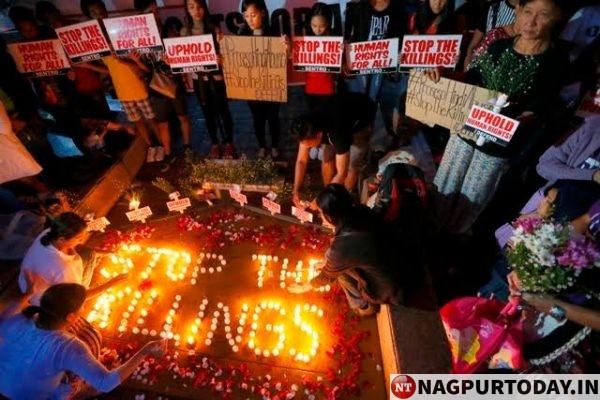A Critical Analysis of Extrajudicial Killing

‘Justice delayed is Justice Denied’ is the current buzzword in the country. Following the brutal rape and murder of the Hyderabad doctor, India has witnessed huge uproar demanding the immediate punishment for the rape accused. Activists have started reporting the incidences of brutal rapes from different parts of the country – Kasganj, Buxar, Unnao and many more, which had aggravated the anger of the people.
A new development took place with the killing of four ‘accused’ (not convict) of Hyderabad case in a police encounter. While what exactly happened is yet to be established, the incidence was followed by the huge applaud for Hyderabad police, throughout the country and the rise in the demands of ‘quick justice’ with people asking the police of the other states to do the same. Amid this din and bustle, it is pertinent to understand that, the concept of ‘quick justice’ which often leads to ‘extrajudicial killings’ undermines the ‘Right to life’ guaranteed under the constitution of India, which forms one of the core ethos of democracy.
The extrajudicial killings in India is not a new arrival. The word ‘encounter’ is quite popular in India and law enforcement agencies have been falling in the controversy since a long time. There have been numerous stories of encounters by police from different parts of the country and the army, in the areas lying under Armed Force Special Power Act (AFSPA). NHRC report in 2013 had highlighted that there were as many as 550 cases of fake encounters from 2010 to 2013! The parallels can be drawn in the recent encounter of Hyderabad, given the timing of visit to scene of crime (around 5 AM!) and the huge public outcry demanding the execution of the four accused. This throws a fundamental question, “has justice been done by killing of the accused?” Those who think yes, should recall the basic difference between an ‘accused’ and a ‘convict’.
In a criminal justice system, the punishment is meant for ‘convicts’ and not for ‘accused’. Article 21 of the Indian constitution provides that “no personal shall be deprived of his life except by the procedure established by the law”. Such extrajudicial killings are in contradiction of this article and are violation of the procedure established by law. The procedure suggests ‘free and fair’ trial before conviction. Irrespective of the nature of the crime, the trial has its own benefit. It provides an opportunity to the accused to put his points and provides explanation of the circumstances that led to the crime. This is necessary in digital era, where the news spread more rapidly through social media platforms like Facebook and Twitter. This often makes accused, a convict before trail! Besides this, there are underlying reasons, because of which a society like India should never promote extrajudicial killings:
First, extrajudicial killings lead to ‘mob justice’, a justice based on the popular sentiments rather than on facts and figures. This undermines the essence of natural justice.
Second, in a country like India, the ‘police’ is an institution, which is often termed as ‘corrupt’. Evidences suggest that there has been a number of cases where police personnel have been suspended for misusing their powers. The recent example is an incident of Gomatinagar (Lucknow), where an executive of MNC was shot dead by a police constable, when he refused to stop the car at night as he was driving with his women colleague. UP police had admitted, on record, that the instance was the violation of law and the constable had used ‘executive force’! Moreover, the police is also controlled and guided by the executives.
Leaving justice to ‘executive’ will severely undermine the principle of separation of powers, as envisaged as a basic feature of Indian constitution by the Supreme Court of India in Keshavanand Bharati Case (1973).
Thirdly, demand of such encounter often rise in case of heinous crimes like rape! However, trends suggest that there are many incidences, where the false rape cases have been registered. Moreover, the data from NCRB shows that in 2016, out of around 38000 reported rape cases, about a quarter (around 10,000) was related to the consensual sex after the false promise of the marriage. Under these circumstances, if rape accused are left to the judgement of executives, the lives of innocents may be in jeopardy.
Finally, a society can’t run on the feeling of ‘revenge’. As said by Mahatma Gandhi, “An eye for an eye will make the whole world blind”. In the zeal of revenge, we often fail to understand that by promoting extrajudicial killings, we are making the people of the society, ‘a beast’. And once, people become a beast, none of us are safe! This is because, justice will be done by the ‘mob’, which is often guided by sentiments and emotions rather than facts.
That said, the term ‘quick justice’ is a misnomer as ‘justice hurried is justice buried’. Justice cannot be ‘quick’, it should rather be ‘efficient’, with a speedy output based on evidences (i.e. inputs). The rising demand of extrajudicial killings and the brutal punishment (as adopted in Gulf countries or in western countries) is the manifestation of the collapsing faith of the people in the law enforcement agencies and the criminal justice system. Encounters may appease the people in short run and help developing fear in the minds of the criminals, but it can never be a long-term solution. The criminal justice system must evolve to win the faith of the people.
Some of possible reforms which can be undertaken include, establishment of fast track courts for heinous crimes (like rape and brutal murder), increasing the number of judges in the courts for filling the unfilled vacancies etc. Besides this, the law enforcement agencies should be sensitised towards the need of the people, especially the women. It is then the real meaning of democracy will be achieved!
Sulekh H.Varma













